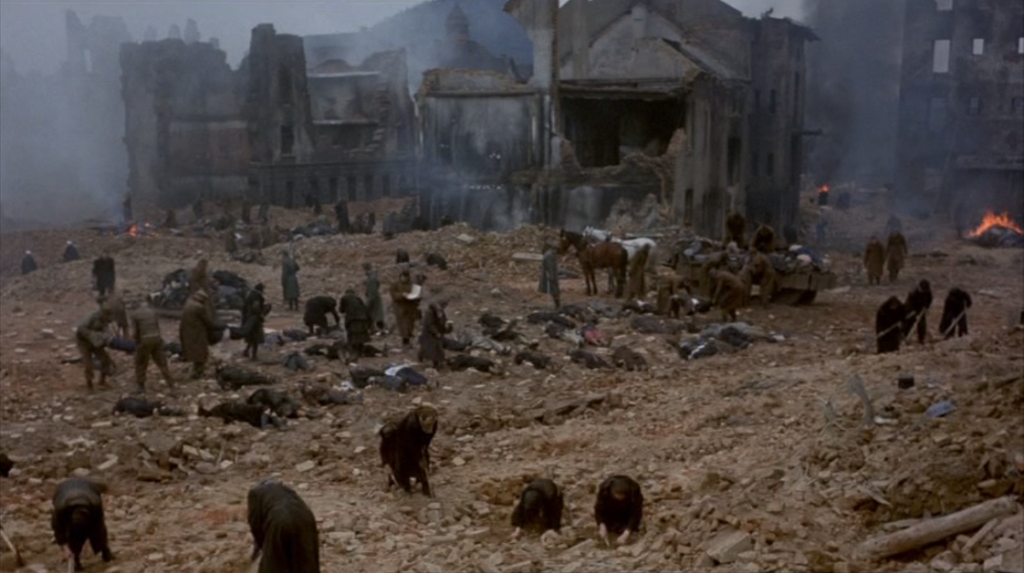Thursday
Chuck Augello, who publishes a website exploring the life and art of Kurt Vonnegut (The Daily Vonnegut), has a Literary Hub article on what the American satirist thought about guns. As a survivor of the firebombing of Dresden, where he was a German prisoner-of-war, Vonnegut had a front-row seat to murderous violence. There was no strategic reason for bombing Dresden, by the way. The British targeted the city, which at the time was filled with refugees as well as prisoners of war, in retaliation for the bombing of London.
Augello notes that, though Vonnegut was an avid collector of old guns before he went to war, that was no longer the case when he returned. His anti-gun sentiments show up in a number of works.
For instance, in his 1970 play Happy Birthday, Wanda June,
Vonnegut satirizes the Hemingway model of masculinity through the main character, Harold Ryan, a World War II vet, big-game hunter, and avid gun enthusiast. At the end of the Third Act, Ryan bellows, “Whoever has the gun … gets to tell everybody else exactly what to do. It’s the American way.” Ryan’s New York apartment is decorated with the pelts of African animals killed for sport. He goads his young son to load a rifle so he can protect his mother from Ryan himself, calling the rifle “an iron penis three feet long.” Throughout the play Ryan’s aggressive “manliness” is symptomatic of a hatred of women born of sexual inadequacy.
In his novel Deadeye Dick (1982), meanwhile, the head of an Ohio arms manufacturing plants boasts “how natural and beautiful it is for Americans to have love affairs with guns.”
In other words, Vonnegut clearly saw how the worship of guns is integrally tied to toxic masculinity.
And then there is this editorial that appears in Vonnegut’s novel Deadeye Dick (not one of his better ones), written by the husband of a pregnant woman who has been killed by someone’s careless use of a gun:
My wife has been killed by a machine which should never have come into the hands of any human being. It is called a firearm. It makes the blackest of all human wishes come true at once, at a distance: that something die. There is evil for you. We cannot get rid of mankind’s fleetingly wicked wishes. We can get rid of the machines that make them come true. I give you a holy word: DISARM.
In one of his own editorials, Vonnetut criticized NRA spokesman Charlton Heston, who celebrated Americans’ accessibility to guns. Vonnegut wrote,
I feel exactly as though he were praising the germs of some loathsome disease, since guns in civilian hands, whether accidental or on purpose, kill so many of us day after day.
It is through Slaughterhouse Five, however, that Vonnegut delivers his most sustained and powerful attack on what he calls “massacre machinery.” Vonnegut used the novel to process his PTSD (see my report of a student’s senior project on the issue), having his protagonist shut down his emotions in the face of the horrors he witnesses. It could be argued that much of America now shuts down its emotions in the face of each new mass shooting.
The phrase “so it goes” captures how Pilgrim shuts down, resorting to the fatalism of a resigned shrug. The words essentially signal that we are helpless and nothing can be done. Slaughterhouse Five appeared early in 1969 and shows Pilgrim using his coping mechanism to process the horrors of 1968:
Robert Kennedy, whose summer home is eight miles from the home I live in all year round, was shot two nights ago. He died last night. So it goes.
Martin Luther King was shot a month ago. He died, too. So it goes.
And every day my Government gives me a count of corpses created by military science in Vietnam. So it goes.
Like Pilgrim, we think we can no more end gun violence than Pilgrim can prevent the British from firebombing Dresden. Of course, this fatalism becomes an out for politicians in the pocket of the gun lobby, who would like us to think that nothing can in fact be done. In other words, they exploit our trauma to line their pockets.
For his part, to lessen the unending cycle of gun violence Pilgrim engages in a significant non-action:
My father died many years ago now—of natural causes. So it goes. He was a sweet man. He was a gun nut, too. He left me his guns. They rust.
In his introductory chapter to Pilgrim’s story, Vonnegut informs us that he passed along something far more life affirming than firearms to his own sons:
I have told my sons that they are not under any circumstances to take part in massacres, and that the news of massacres of enemies is not to fill them with satisfaction or glee.
I have also told them not to work for companies which make massacre machinery, and to express contempt for people who think we need machinery like that.
Allow me to express my own contempt—and my horror—at all those who have made America a haven for gun violence. They may wear $1000 suits, but they have blood on their hands.


